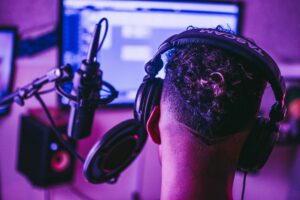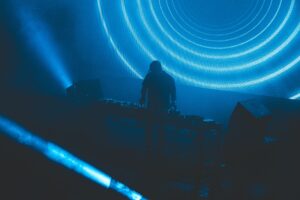Social media has shifted the music industry drastically. With the first social media platform invented in 1997, it’s easy to forget how fast technology has grown. Social media is now one of the most fundamental ways for music artists and creatives to market themselves, create an audience and connect with true fans. Whether it be showcasing their work or inviting people along to shows, the reach is pretty endless. Musicians have used social media platforms such as YouTube, Instagram and more recently TikTok to develop their careers.
Before social media, artists were more focused on playing shows in the hope that enough fans were present and that A&R reps would show, however with the use of social media, this actually empowers more artists and creatives to be seen and heard and can encourage even more fans to come to gigs. As we all know social media has had its fair share of negative press but it is equally a necessary tool for discovery for musicians and a way to maintain and engage with relevant audiences. So, does social media do more harm or good for musicians? As a phenomenon that’s here to stay, it’s important to discuss how to deal with this addiction to social media and create healthier behaviour patterns around it.
The power of social media
As we know, social media can be the start of an artist’s career. Just to name a few examples of musicians that have blown up over socials include the likes of Alessia Cara who started posting Youtube videos where she was first discovered or Sam Ryder who used TikTok during lockdown before entering Eurovision 2022.
More recently, a few months ago the famous composer Ólafur Arnalds posted an improvisation online which was later remixed by multiple musicians and vocalists on Instagram. As he was scrolling through to see the remixes he came across one of Ella McRobb, a songwriter and artist who was working on her early releases at the time. He played it over so many times that he just had to reach out to her and fast forward a few weeks she was flown out to Iceland where Ólafur resides to record the vocals with live strings players and the track was released just weeks afterwards on Ella’s birthday.
This just shows that growth from social media can really happen to any of us and just takes one strong piece of content – sticking to our true artistry is key to this.
One way to really be seen by people on socials is through algorithms – where relevant content is pushed to users based on their behaviours. This could be where artists get lost – by trying to appeal to a certain audience rather than sticking to their true brand. Algorithms can however help with the exposure of musicians, so a balance here is very important. Trends on social media can really help an artist’s exposure but can leave them feeling dissatisfied with their career and can negatively impact mental health which we will discuss in more detail below.
“When asked ‘Does using social media negatively impact your mental health in any way?’, 70% of Qube members who took part in the survey answered yes.”
Mental health and social media
Social media has of course had its fair share of negative press, highlighting the impact of social media use and the increasing anxiety and depression statistics among users.
It comes as no surprise that we are all addicted to our phones and social media with it constantly being all around us. But the question is, how effectively are we actually using social media and what can we do to improve this?
As we know artists posting content online are exposed to a lot of social media regularly whether it be jumping onto a new trend or posting their own unique content, but a lot of creatives, including myself, have in fact become addicted to social media and this is why.
Dopamine is a chemical in our brains that makes us feel good. Firstly it’s important to note that dopamine levels are highest in the morning after we sleep – we are more vulnerable to things that spark dopamine and also more vulnerable to stress. If we scroll first thing to get those dopamine hits, our brain then relies on this throughout the day. We might see things that we enjoy which have a positive effect or we might see things that don’t have a positive effect. As we continue to scroll and look for things that grab our attention we get the dopamine hit we are after.
Checking our phones first thing and endlessly scrolling can increase stress and anxiety levels and reduce our productivity. When we scroll for a while these dopamine hits actually deplete our dopamine, reducing overall mood and motivation. An extortionate 73% of independent musicians struggle with mental illness and this jumped to 80% when researchers looked at the 18-25 age group and social media is most definitely a factor in this. Constantly comparing ourselves to others online is what we are all subject to doing and what in my own experience has put me off posting online content. Not surprisingly, when asked ‘Does using social media negatively impact your mental health in any way?’, 70% of Qube members who took part in the survey answered yes.
How to use social media effectively
However, there are ways to use social media more effectively and healthily. It can be useful to delay checking our phones for the first hour after we wake due to high dopamine levels. With this in mind, here are a few tips that can help us to use social media less throughout the day and how we can be more productive when using the platforms.
-
- Set your phone in another room at night – use an alarm clock
- Have separate social media accounts for business and personal
- Set a specific length of time for creating content
- Limit scrolling time to 20 minutes a day
- Get some daylight, connect with others and take regular breaks
- Avoid comparing yourself to others on social media – you do you!
The future of social media
If you aren’t using social media at the moment to grow your career you could be missing an opportunity. However, as we all know, it’s important to use social media in small doses to create a sustainable, healthy life-work balance. Dedicating time to create content, research trends and take advantage of social media algorithms can really maximise exposure and help build a true audience or even network with collaborators which can increase traction. Fundamentally sticking to our true artistry underlies all of the above because at the end of the day, this is what will create longevity as an artist.



